Last updated: September 10, 2021
Article
Eunice Kennedy Shriver: Champion for Change
You are the stars and the world is watching you. By your presence you send a message to every village, every city, every nation. A message of hope. A message of victory: "The right to play on any playing field? You have earned it. The right to study in any school? You have earned it. The right to hold a job? You have earned it. The right to be anyone's neighbor? You have earned it." The days of segregation and separation are over!
- Eunice Kennedy Shriver
Charge to the Athletes at the Opening Ceremonies of the International Summer Special Olympics Games, South Bend, Indiana, August 2, 1987
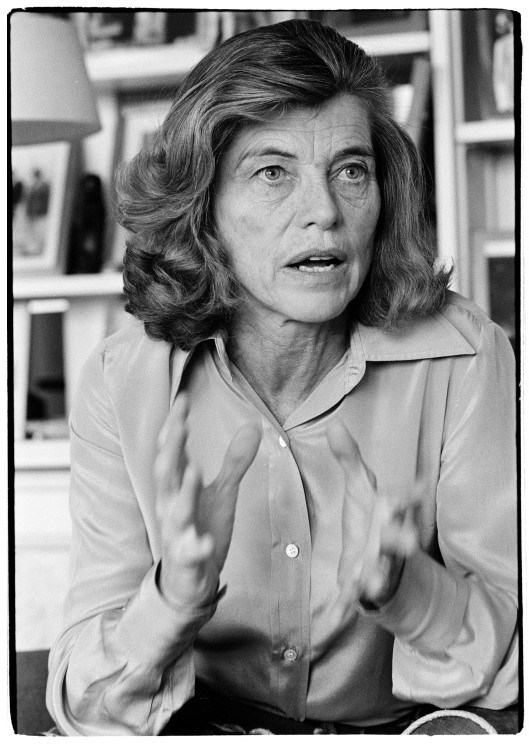
NPG.2011.34, National Portrait Gallery, Smithsonian Institution; gift of Diana Walker.
© Diana Walker
Eunice Kennedy was born in Brookline, Massachusetts on July 10, 1921, the fifth child of Joseph and Rose Kennedy. Although underweight, frail, and susceptible to illness as a child, Eunice displayed great energy that was rivaled only by her intelligence and precocious nature. Mrs. Kennedy recalled her daughter’s “highly conscientious demeanor” and noted that Eunice mimicked her older brothers, acting as a leader among her younger siblings. Considered by her mother to be the most sensitive, religiously devout, and mature of the Kennedy children, Eunice developed a particularly close bond with her older sister, Rosemary, who had intellectual disabilities. This connection helped foster a lifelong dedication to empowering those who may have otherwise been marginalized by society. Through her work in politics, government, and social activism, Eunice Kennedy Shriver improved the lives of millions of people around the world.
Education
Eunice began her education in 1925 at the Edward Devotion School (now known as the Florida Ruffin Ridley School) near her birthplace in Brookline, MA. Upon her family’s move to New York in 1927, Eunice was enrolled in the prestigious Riverdale Country Day School and remained there for several years before attending the Convent of the Sacred Heart in Noroton, Connecticut. As a student, she developed a reputation for being intelligent, studious, and devout, which served her well. When her father, Joseph Patrick Kennedy Sr., was appointed ambassador to Great Britain in 1938, Eunice transferred to the Convent of the Sacred Heart in Roehampton, England. There, she was named both the most popular student and the student who had done the most for the school. After graduation, Eunice enrolled in Sacred Heart College in Manhattanville, New York. It was a Catholic school with a reputation for promoting social justice.
After studying at Sacred Heart College for two years, Eunice transferred in 1942 to Stanford University in California. The Kennedy family hoped that California’s climate would be more hospitable to her frail condition. While at Stanford, one of her closest friends was killed in a car crash. In processing her grief, Eunice devoted herself to academics and athletics. She became the first woman in her family to graduate from a four-year college, receiving a Bachelor of Arts degree in Sociology.
Political Involvement
Born in 1921, the year after women first received the right to vote in federal elections, Eunice Kennedy Shriver never ran for political office. However, she took on pivotal roles in the campaigns of her brothers John, Robert, and Edward, and husband, Sargent – much as her mother had done with her own father and sons.
Eunice, and the rest of the Kennedy family, recruited and coordinated volunteer hostesses for the tea parties crucial to John’s 1952 senate campaign. Eunice also organized an elegant reception for 1,500 Irish Catholics to enlist their support, days before the upcoming election. In later campaigns for her brothers and husband, Eunice spent months traveling the country to deliver speeches at luncheons, retirement homes, colleges, fundraisers, and on radio and television programs. The hectic pace of the campaign suited Eunice’s acutely competitive drive. Eunice, who had been competing athletically since her youth, recalled, “I was twenty-four before I knew I didn’t have to win something every day.” After John’s successful 1960 campaign for the presidency, Eunice required hospitalization for fatigue and exhaustion, prompting her mother to write “I have known few people in the world to match her for initiative and energy and drive. […] She [Eunice] thinks I have a lot of energy, but she amazes me.” Around this time, Eunice was diagnosed with Addison’s disease.
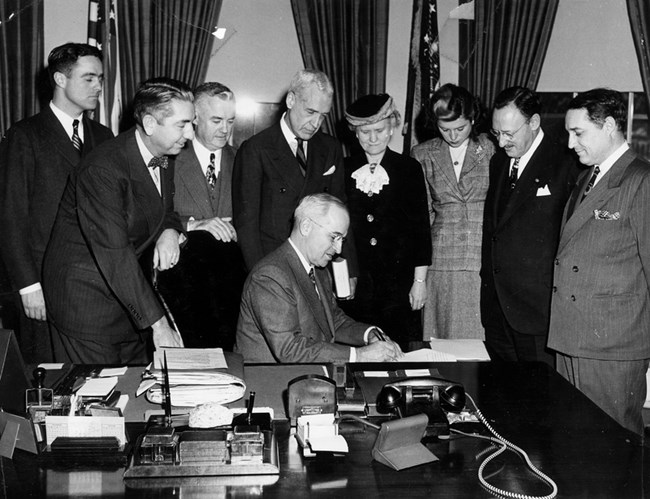
L to R: Sargent Shriver, Attorney General Tom C. Clark, Oscar Ewing, G. Howland Shaw, Katharine Lenroot, Eunice Kennedy, Frank L. Weil, John W. Andrews.
Abbie Rowe, National Park Service
Harry S. Truman Library & Museum.
Service and Activism
In 1946, Eunice began work as the executive secretary to the Juvenile Delinquency Committee at the Department of Justice. There, she demonstrated strong compassion for underprivileged youth. She created policy to prevent teenagers from dropping out of high school by teaching them trades and vocational skills. Later, she worked as a social worker at a women’s prison in North Carolina. She then joined her sisters Patricia and Jean in Chicago, where she worked with survivors of sexual abuse and teenage mothers who were under the care of the state. During those years, Eunice attended graduate school for social work at the University of Chicago and also met Robert Sargent Shriver, Jr. , whom she married in 1953.In 1958, Eunice and Sargent traveled across the country to meet leading philanthropists, researchers, and academics in an effort to improve the Joseph P. Kennedy Jr. Foundation, which was established in memory of Eunice’s oldest brother, Joe Jr., who was killed in WWII. With Rosemary in mind, Eunice eventually decided that the foundation should shift its focus to concentrate on funding research for children with intellectual disabilities. She spearheaded many of its initiatives over the decades that followed. During the Kennedy Administration, Eunice lobbied her older brother and his advisers to create a national committee on intellectual disabilities. She also suggested developing an organization similar to a domestic version of the Peace Corps to help those most in need. When her husband served as the ambassador to France from 1968-1970, Eunice taught a weekly class to 140 intellectually disabled children in Paris as part of an effort to educate the French citizenry about intellectual disabilities and compel its leaders to take action.
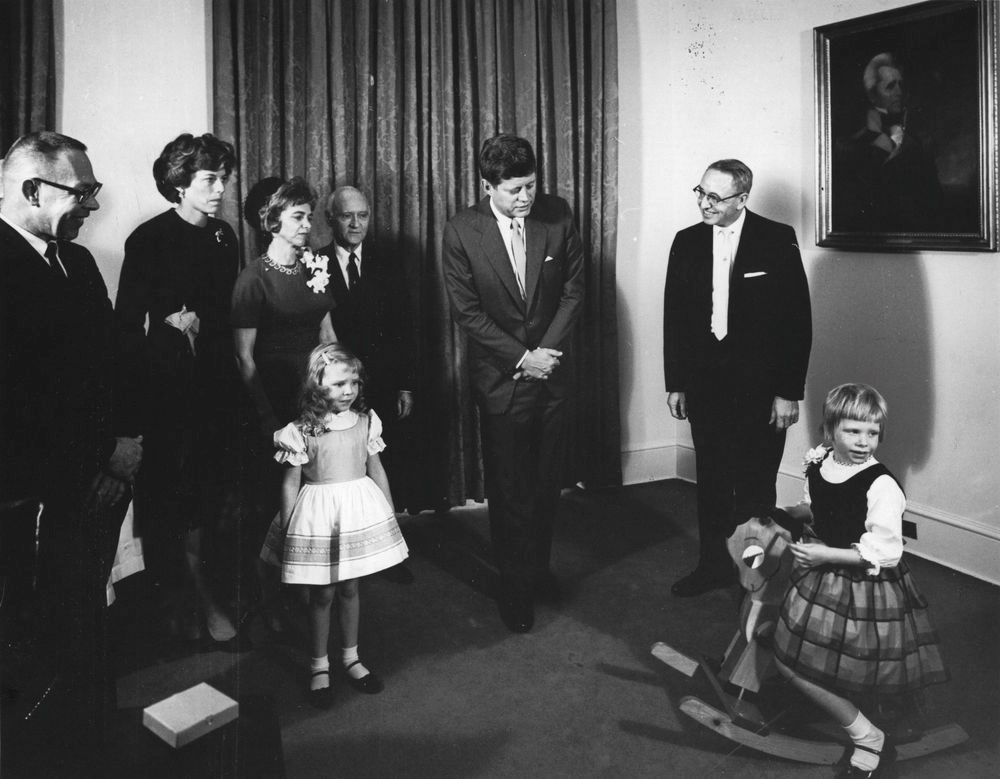
Abbie Rowe. White House Photographs. John F. Kennedy Presidential Library and Museum, Boston
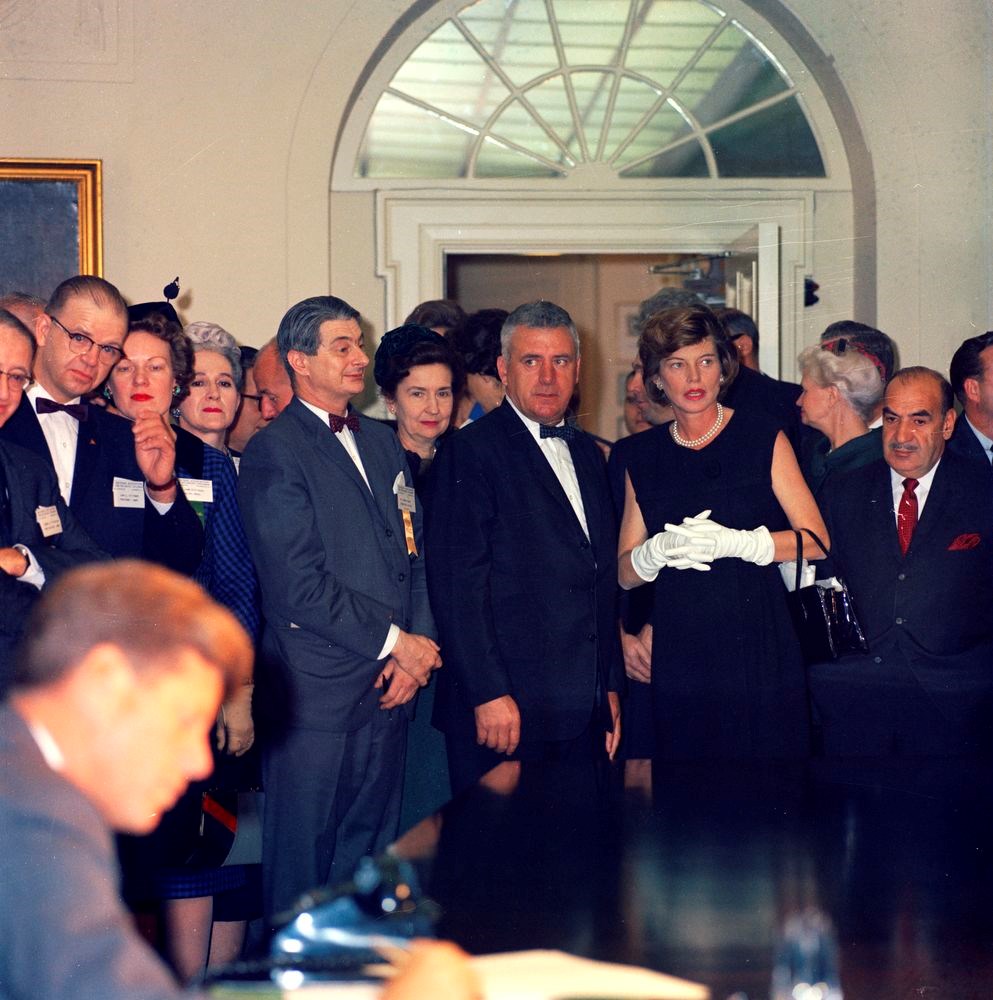
Cecil Stoughton. White House Photographs. John F. Kennedy Presidential Library and Museum, Boston
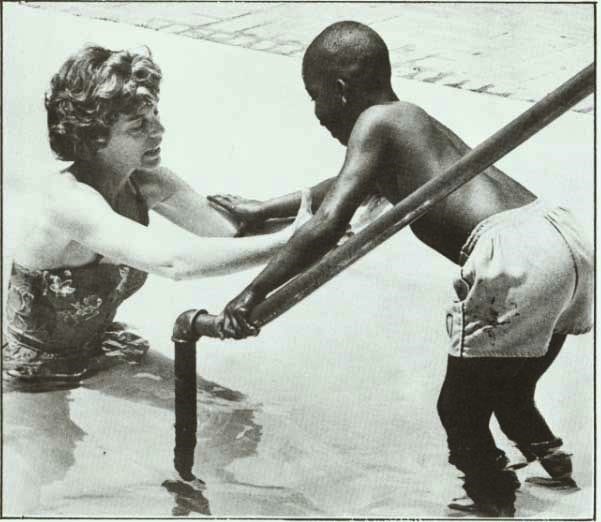
Courtesy of the Special Olympics
The Special Olympics
In 1961, Eunice started a summer camp for children with intellectual disabilities on the lawn of her Maryland estate. One year later, she decided that the Kennedy family should publicly acknowledge Rosemary’s condition for the first time, leading Eunice to write an essay in the Saturday Evening Post, a very popular weekly magazine. Though the wording of this article is now outdated, the article was an important contribution to disability literature. She addressed the prejudices of the general public surrounding people with intellectual disabilities and urged funding for medical research, job training, and group homes. Eunice wrote, “Like diabetes, deafness, polio, or any other misfortune, [intellectual disabilities] can happen in any family. It has happened in the families of the poor and rich, of governors, senators, Nobel prizewinners, doctors, lawyers, writers, men of genius, presidents of corporations – the President of the United States.”
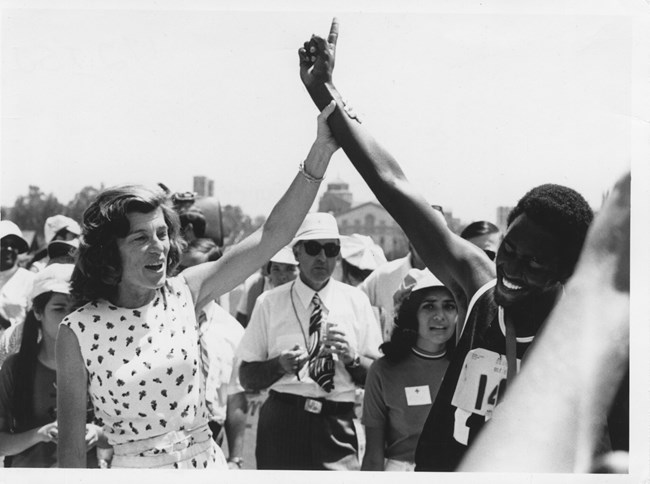
Courtesy of the Special Olympics
Through Eunice’s encouragement and the Joseph P. Kennedy Jr. Foundation’s funding, the first Special Olympics were held in 1968 at Chicago’s Soldier Field and hosted 1,000 athletes from 26 states and Canada. Today, the Special Olympics furthers Eunice’s mission of empowering those with intellectual disabilities and fostering competitiveness and athleticism on a worldwide scale. In 2019, nearly 115,000 Special Olympics sports competitions were hosted around the world, with more than 5.7 million athletes from 200 countries.
"Today's Chicago Special Olympics Games have not been organized as a spectacle. They are not being conducted just for fun.The Chicago Special Olympics prove a very fundamental fact. That exceptional children ... can be exceptional athletes, the fact that through sports they can realize their potential for growth. ... But they are only 1,000 out of one-and-one -half million [children with intellectual disabilities] who should be competing in games like this all over America. But most of these million-and-one-half children live in communities where there are no games, no exercise, no competition for [those with intellectual disabilities]."
- Eunice Kennedy Shriver
Opening Remarks of the 1968 Chicago Special Olympics, Chicago, Illinois, July 20, 1968
In recognition of her tireless efforts to improve and enhance the lives of people with intellectual disabilities, Eunice was awarded the Presidential Medal of Freedom by President Ronald Reagan in 1984 and received a papal knighthood from Pope Benedict XVI in 2006. She died on August 11, 2009 at the age of 88. Today, Eunice’s five children, Robert, Maria, Timothy, Mark, and Anthony, manifest their mother’s dedication to public service and continue to shape their family’s legacy.
In ancient Rome, the gladiators went into the arena with these words on their lips: let me win, but if I cannot win, let me be brave in the attempt. Today, all of you young athletes are in the arena. Many of you will win. But even more important, I know you will be brave and bring credit to your parents and to your country. Let us begin the Olympics, thank you.
- Eunice Kennedy Shriver
Opening Remarks of the 1968 Chicago Special Olympics, Chicago, Illinois, July 20, 1968
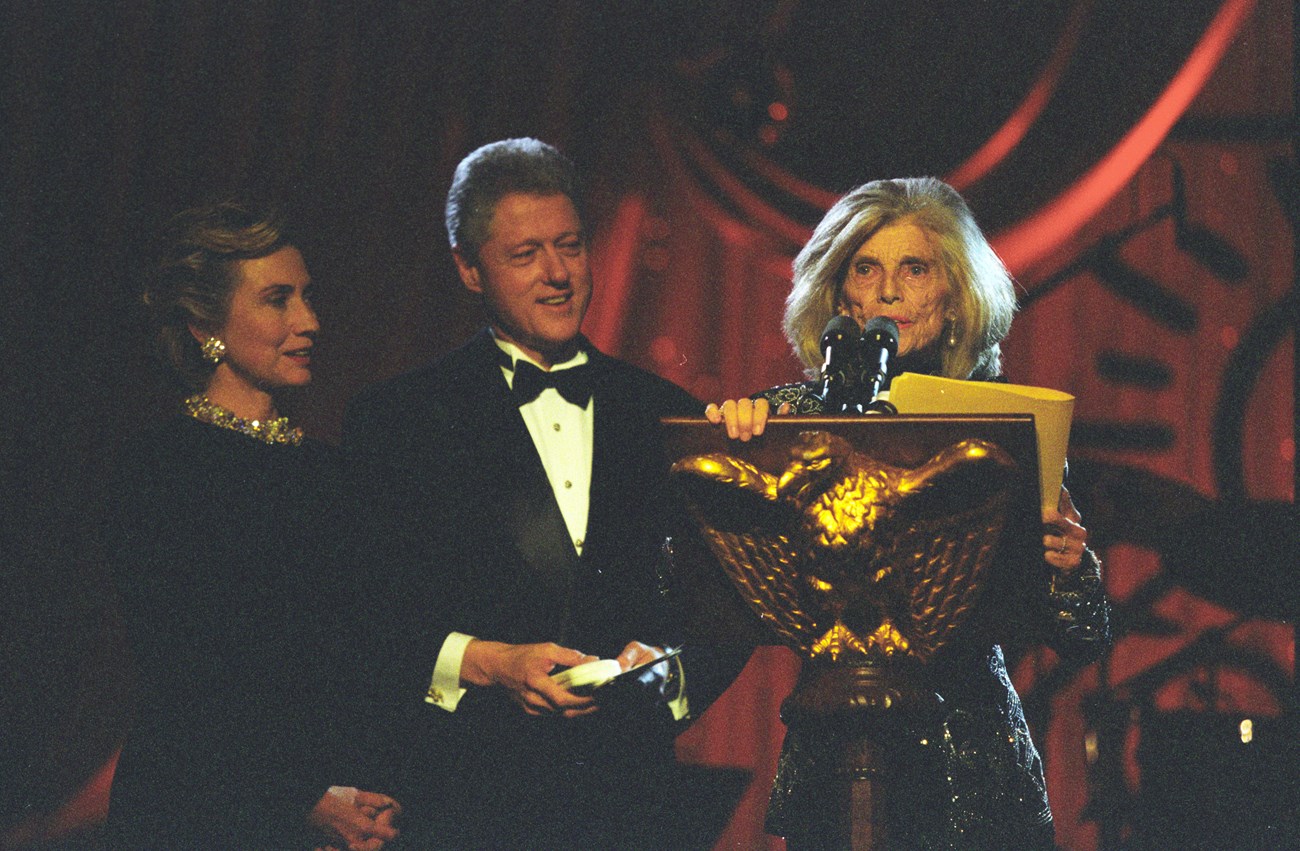
Ralph Alswang, Photographer. Photographs and other Graphic Materials, National Archives
Watching your lifetime of dedication to public service has been a personal inspiration to me and to so many others. And we have all learned–from your example–the true value of family, particularly amidst the strains of public life.
Tonight, I want to applaud your lifelong commitment to the Special Olympics--which has given children around the world the confidence and inspiration to overcome obstacles, and reach their fullest potential. But perhaps more importantly, you have helped all of us imagine a future in which every child can lead a life of dignity and accomplishment.
— First Lady Hillary Rodham Clinton, White House Special Olympics Dinner, December 17, 1998
Tags
- john fitzgerald kennedy national historic site
- kennedy
- kennedy family
- shriver
- special olympics
- disability awareness
- disability history disability rights movement
- disability history empowerment and community
- disability history presidents
- irish-american heritage
- irish-american heritage month
- irish american history
- women history
- women warriors
- womens history month
- presidential medal of freedom
- irish-american
- jfk
